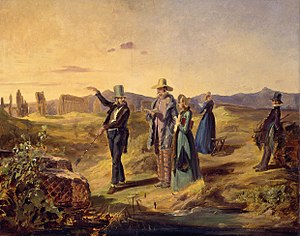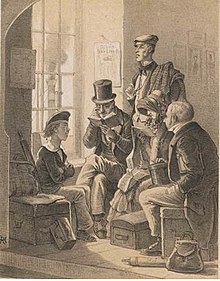English people
![]()
This article or subsequent section is not sufficiently supported by evidence (e.g., anecdotal evidence). Information without sufficient evidence may be removed in the near future. Please help Wikipedia by researching the information and adding good supporting evidence.
The English (English the English or English people) are a people of about 50 million (with English-born diaspora about 90 million) who live predominantly in England, the largest country on the island of Great Britain. They make up about 84% of the population of the United Kingdom. In addition, (often large) parts of the population in the other parts of the British Isles, i.e. Ireland (especially Northern Ireland), Scotland and Wales, as well as the (immigrant, non-indigenous) population of some countries of the former British Empire and Commonwealth respectively, are of ethnic English descent (especially in Australia, Ireland, Canada, New Zealand, South Africa and the United States of America).
In the German-speaking world, all inhabitants of the United Kingdom are often mistakenly referred to as Englishmen, although all citizens of the United Kingdom as a whole are called British. In relation to the respective parts of the country, one speaks of Englishmen, Scots, Welshmen, Irishmen, Cornish or Manx.

Historical reception: Englishman in the Campagna, watercolour by Carl Spitzweg, ca. 1845
Language
Their language is the English/Inglis, (before 1066, Englisc) which has been uniformly established since about the 14th century and which originated from the Old Saxon of the Saxons and is therefore counted among the West Germanic languages. The name derives from the ethnic tribe of the Angles (Land of the Angles-Englelond/Ingland-England). Until the early Middle Ages, insular Celtic, or more precisely Goidelic and Britannic languages, and from 1066 Anglonormannic, were in use in England.
History of English identity
According to a widespread view, the English originated from the original Celtic population of the British Isles and the Germanic peoples of the Angles, Saxons, Frisians and Jutes who migrated from northern and central Europe from the 5th century onwards. These West Germanic peoples, grouped together under the name of Anglo-Saxons, were first called English at about the same time as the Romans left Britain, and from this their country was called England. The Anglo-Saxons largely displaced the Celtic-British natives in the area of present-day England (with the exception of Cornwall).
The British physician Stephen Oppenheimer contradicts this view. In his view, genetic studies show that the English are largely descended from the pre-Celtic indigenous population that migrated from the Iberian Peninsula after the end of the last ice age. Later immigrants such as Celts, Anglo-Saxons, Vikings and Normans would have contributed little to the English gene pool. This view is contradicted by British evolutionary geneticist Mark G. Thomas. From y-chromosomal similarities between English, Frisian and Scandinavian men, he concludes that the Anglo-Saxon conquerors wiped out 50 to 100 per cent of the existing population, so that the majority of today's English are descended from them.
In the 9th and 10th centuries there was a regionally not insignificant Danish immigration (Danelag). Around the same time, the English were united for the first time under a common rule. In 937 there was the first Anglo-Saxon-English kingdom under Æthelstan, which extended over the whole of present-day England.
From 1066 and the Norman conquest of England (Battle of Hastings) there was also a strong Norman influence, the Normans became the new social elite of England.
Until the 18th century, the identities of the English, Scots and Irish were clearly separated (with the exception of the Anglo-Irish upper classes in Ireland). It was only with the personal union of James VI and James I respectively as King of Scotland and England, and with the Act of Union in 1707, which united Britain politically, that something like a British identity emerged. This was also true to a lesser extent for Ireland, which was politically united with Great Britain in the Act of Union 1800. In parallel, however, an identity of its own developed there since the early modern period, shaped by Catholicism and Gaelic-Celtic tradition, which stood in contrast to the British-Protestant identity. This opposition led to a strong desire for independence, so that Ireland and a large part of its territory seceded from British rule in 1922 as the Irish Free State, later the Republic of Ireland.

English people , illustration by Henry Ritter, 1852
Search within the encyclopedia